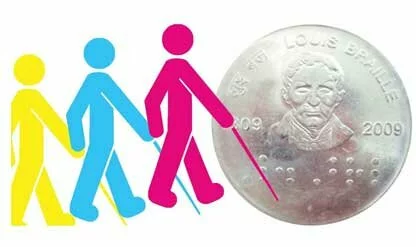Budget 2014 : a great policy beginning for the blind
The Union Budget 2014, which was the first full-fledged Budget presented by the Modeled NDA government envisaged several schemes for persons with blindness in India. It proposed to lay foundation of 15 more Braille presses, aimed to prepare a plan with RBI to provide Indian currency with Braille signage, called for the establishment of National Institute of Inclusive and Universal Design and proposed for National Centre for Disability sports. The Indian government for the first time allocated Rs 560 crore to the Department of Disability Affairs under the Ministry of Social Justice and Empowerment for five years. Such huge budgetary allocation to the disability sector created a buzz in the print media and some of the prominent national daily published an Editorial lauding government’s initiative.
Despite the slue of measures proposed by the Finance Minister Arun Jaitely in the Union Budget 2014, Activists working with blind people expressed apprehensions on realizing these goals. They strongly argue that proposal for providing currency embossed in Braille to blind people is not feasible. Notes with Braille signs will wear out soon.Raised dots will not remain on banknote in the long run. RBI, India’s apex bank proposed to introduce plastic notes of Rs. 10 but its trial has been delayed for indefinite period. Many countries such as Canada and Chile provide tactile feature in a corner on printed notes for the blind people. But such feature is of no help for those who do not know Braille and become blind late in their lives. Given the technological advancements over the years, many techy tools couldprove handy for identifying different denominations of notes by the blind.
 The persons with disabilities were expecting doubling of tax exemption but the Finance Minister did not address this concern. The Union Budget also disappointed disability sector by not proposing measures to fulfilling long pending demand of 3 per cent employment despite recent Supreme Court’s landmark judgment. Blind women who face discrimination in myriad ways in the society have not received any specific attention in the Union Budget. Over the last one decade Screen reading software such as JAWS has become popular among blind computer literate. But this software is too costly to afford for majority of blind students who belong to humble family background. They hoped that the Union Budget 2014 would provide import duty waivers and excise exemptions so that majority of poor blind people could be able to buy software for their educational needs. But Budget had no provision facilitating such relaxation.
The persons with disabilities were expecting doubling of tax exemption but the Finance Minister did not address this concern. The Union Budget also disappointed disability sector by not proposing measures to fulfilling long pending demand of 3 per cent employment despite recent Supreme Court’s landmark judgment. Blind women who face discrimination in myriad ways in the society have not received any specific attention in the Union Budget. Over the last one decade Screen reading software such as JAWS has become popular among blind computer literate. But this software is too costly to afford for majority of blind students who belong to humble family background. They hoped that the Union Budget 2014 would provide import duty waivers and excise exemptions so that majority of poor blind people could be able to buy software for their educational needs. But Budget had no provision facilitating such relaxation.
The proposed schemes for blind people in the Union Budget 2014 clearly manifest government’s conventional understanding about the challenges face by blind people. The Union Ministers and the senior bureaucrats are yet to be made aware about the technological developments which have proved boon for blind in the country and need consistent governmental support. Nonetheless, Budget 2014 was historic in many sense for disability sector. Now onus lies on the disability rights activists to unitedly negotiate and lobby with the government to see the proper implementation of the proposals in the Budget. Right to Information (RTI) Act could be wisely used by activists working with the blind people to highlight the sectoral spending of huge outlays proposed to the Department of Disability Affairs in the 12 5 year plan. Narendra Modi government deserves kudos for embarking on a progressive policy initiative; which if properly actuated on the ground may usher in transformative change in the living standards of blind people in the country.
Avinash Shahi
Latest posts by Avinash Shahi (see all)
- Budget 2014 : a great policy beginning for the blind - August 7, 2014
